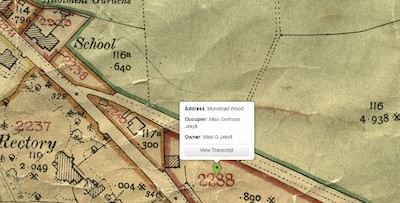The following announcement was written by the folks at TheGenealogist:
TheGenealogist has released 225,395 heads of households and property owners from the 1910-1915 Lloyd George Domesday Survey, covering the county of Surrey.
This boosts its ever-growing Landowner and Occupier records from this period to a total of over 2.6 million. The coverage of these IR 58 records now includes all the boroughs of Greater London plus Bedfordshire, Berkshire, Buckinghamshire, Hertfordshire, Oxfordshire, Middlesex, Northamptonshire and with this release, Surrey.
Fully searchable on TheGenealogist and added to its powerful Map Explorer™, this resource allows researchers to find ancestors’ property from all of Surrey's parishes.

Lloyd George Domesday Survey map locating a plot linked to the record of renowned horticulturist Gertrude Jekyll on TheGenealogist
The records reveal the names of owners and occupiers of each property and can provide detailed descriptions of the numbers and types of rooms in the house, plus what it was constructed of and the extent of its garden or grounds. A great example is Munstead Wood, which we look at in our featured article below. It was described as being a detached residence built of Bargate stone, brick and tile. There was a hall, sitting room, dining room, book room, workshop, kitchen and scullery. Also noted were the store rooms, some spare rooms and offices. The residence was a four bedroom home, with another three rooms allocated as servant’s bedrooms. Covering 14 acres, this home and grounds can then be seen on the contemporary map, linked to the record, as a triangular plot outside the town of Godalming.
This extensive project has seen a long term collaboration between The National Archives and TheGenealogist to conserve and digitise these records. These Lloyd George Domesday Survey records comprise the IR 58 Field Books and their accompanying IR 121 to IR 135 Ordnance Survey maps and join the millions of records in TheGenealogist’s powerful research tool, Map Explorer™.
Visit thegenealogist.co.uk/1910Survey for more information.
Read TheGenealogist’s article, The Strange Case of Jekyll (and Hyde) the Garden Expert, in which these records were used to find the property of a notable resident of Surrey: https://www.thegenealogist.co.uk/featuredarticles/2024/the-strange-case-of-jekyll-and-hyde-the-garden-expert-7431/
Get 15 months for less than the price of 12
To celebrate this latest release of the Lloyd George Domesday Records, TheGenealogist is offering readers a superb offer! You can claim their Diamond package for just £114.95, (£60 off, plus a subscription to the Discover Your Ancestors Online Periodical worth £24.99) Total saving £84.95!
This offer comes with a Lifetime Discount, meaning you’ll pay the same discounted price every time your subscription renews.
To find out more and claim the offer, visit: https://thegenealogist.co.uk/MGBLGD424
This offer expires: 31st July 2024
About TheGenealogist
TheGenealogist is an award-winning online family history website, which puts a wealth of information at the fingertips of family historians. Their approach is to bring hard to use physical records to life online with easy to use interfaces such as their Tithe and newly released Lloyd George Domesday collections.
TheGenealogist’s innovative SmartSearch technology links records together to help you find your ancestors more easily. TheGenealogist is one of the leading providers of online family history records. Along with the standard Birth, Marriage, Death and Census records, they also have significant collections of Parish and Nonconformist records, PCC Will Records, Irish Records, Military records, Occupations and Newspaper record collections amongst many others.
TheGenealogist uses the latest technology to help you bring your family history to life. Use TheGenealogist to find your ancestors today!
 Latest News Articles
Latest News Articles If you do not see a Plus Sign that is labeled "Add comment," you will need to upgrade to either a (FREE) Standard Edition or a (paid) Plus Edition subscription
If you do not see a Plus Sign that is labeled "Add comment," you will need to upgrade to either a (FREE) Standard Edition or a (paid) Plus Edition subscription